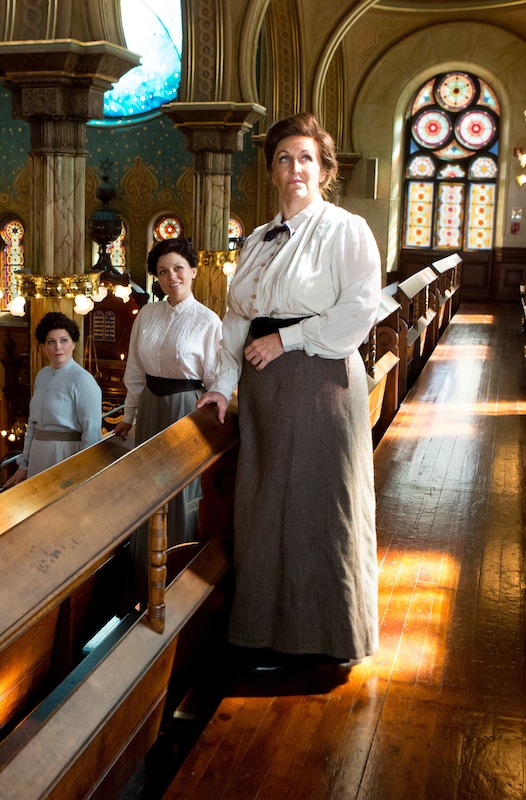On Site Opera mines the rich drama of Gordon’s moving “Morning Star”

Emily Pulley (front), Cree Carrico, and Blythe Gaissert in On Site Opera’s production of Ricky Ian Gordon’s “Morning Star.” Photo: Angela Gaul
We hear so much about the big arts institutions and their struggles, it’s easy to miss the fact that New York has a vibrant opera scene, much of it in the form of small companies doing admirable work on a more limited scale.
One standout in that department is On Site Opera. Founded in 2012, this fledgling outfit already has the feel of an established and polished company, presenting unusual repertoire in spaces specifically chosen for their resonance with the piece.
Their production of Ricky Ian Gordon’s 2015 opera Morning Star, which opened Wednesday evening, provides an exemplar. Based on a 1940 play by Sylvia Regan, the story follows the lives and tragedies of the Feldermans, a Jewish immigrant family on the Lower East Side. The breathtaking Eldridge Street Synagogue, where this brief run is being staged–now a museum– could very well have been their local temple.
We find a middle-aged widow, Becky Felderman, who has toiled to raise three daughters, all now adults. The middle sister, Fanny, quickly falls for the budding vaudeville composer Irving Tashman. Meanwhile the studious Harry Engel has attracted the attentions of both the eldest, Sadie, and the youngest, Esther, who wins his heart.
The central catastrophe of the opera is the Triangle Factory Fire of 1911, in which Esther perishes—on what was to be her wedding day, no less—leaving Sadie to marry the heartbroken Harry. For a tragedy that is so iconic—especially in New York—and so important in America’s social history, the Triangle Fire, 107 years on, feels oddly remote: a historical event whose emotional memory has recently faded. Morning Star manages to bridge that distance by creating an intimate story around it, making the event seem raw even today.
The libretto by William M. Hoffmann, who died in 2017 and to whom Wednesday’s performance was dedicated, is lovingly realized, lively but emotionally rich. Hoffmann’s text finds beauty as much in details of ordinary life as in the soft poetry of its grief.
The first act is tightly spun, painting a vivid portrait of each character without ever feeling bogged down in exposition. The second, showing the dissolution of the family’s relationships after the fire and Esther’s death, takes a scene or two to regain that focus, but manages to come together in reconciliation. One of the most striking scenes, a terrifying depiction of the fire itself, unfortunately seems to have been lopped off of the end of Act One in order to provide a lasting final image; the preceding chorus about finding happiness in the face of life’s trials offers a more natural closing thought.
Gordon’s score is keenly attentive to the text, highlighting its cross-rhymes and enjambments in the line of the music. It is also an impressive achievement in its own right, showing the composer’s ability to write in a number of different registers to great effect. Wistfulness and mourning keep company in this score with folk elements and riotous nods to ragtime. Gordon writes a moving, revealing aria for every one of the major characters as well as a number of aching duets. His vocal writing is fluid and natural, and there is a bright, fresh sound to all the music.
These performances present the world premiere of a chamber orchestration by Bruce Coughlin—the reduction sometimes calls for an economy of texture, but never feels thin. The American Modern Ensemble, under the direction of Geoffrey McDonald, handled the score brilliantly, playing tightly but with rich color.
On Site’s superb cast is led by Emily Pulley as Becky Felderman, who finds a touching weariness in her portrayal of the duty-bound, worn-down Becky. Jennifer Zetlan brought her blazing soprano to the role of Fanny; she gave a particularly moving rendition of her monologue “If I am not allowed to sing,” turning from frustration into resignation as her marriage to Irving destroys her dream of a performing career. Sadie has the largest arc to traverse, from the most neglected of the three sisters to bitter and ruthless factory owner. Blythe Gaissert managed the turn admirably, bringing a dark mezzo-soprano to match her complex characterization.
As Aaron Greenspan, the family friend who becomes engaged to Becky in the opera’s final moments, Joshua Jeremiah exudes personal warmth, and brings a brawny, dusky baritone to the role. Blake Friedman’s full tenor, slightly dark but with a buttery top, makes him a perfectly slick Irving—he crooned nicely in “O Morning Star,” the love song he writes to woo Fanny.
David Langan showed an earthy resonance as Rabbi Engel, and Allison Gish displayed an energetic mezzo as Kathleen. Chrystal E. Williams offered rich power as Mary. Martin Bakari was especially memorable among the supporting cast as Prince, an all-purpose street vendor, with his muscular tenor and confident bearing.
Standing out from all the rest were the couple that should have been, Harry Engel and Esther Felderman. Andrew Lovato’s warm, lean baritone fit his part perfectly, and he showed a strong vocal connection to his character. His final monologue was arresting, a powerful outburst from the opera’s most decent character, who had patiently borne so much suffering.
Cree Carrico, meanwhile, brought a bright soprano and wide, winging phrases as Esther. She is, moreover, a sensational actress; there is an irrepressible brightness in her spirit, and it’s almost hard to watch anyone else when she’s on stage. Even in her reactions to other characters, she hints at a rich inner life with just the flitting of her eyes, or the quick bite of a nail.
A deft staging by artistic director Eric Einhorn is completely immersing—sitting in the pews, we watch the action all around us but never feel disoriented. Einhorn makes the most of the space’s possibilities, tapping into its spiritual significance to aid his vision: in the Prologue, a funeral service for the Triangle victims, Rabbi Engel asks the audience to stand as caskets are carried in and a mourning chorus is sung by the full cast. That it’s hard to imagine this work being performed anywhere else is a testament to Gordon’s music, the production team and to On Site Opera’s unique mission.
Morning Star will be repeated 7:30 p.m. Friday and 1 p.m. and 6 p.m. Sunday at the Museum at Eldridge Street. The Sunday performances coincide with the 107th anniversary of the Triangle Fire. osopera.org



Posted Mar 22, 2018 at 10:58 pm by meche
Beautifully written!
Posted Mar 23, 2018 at 4:44 pm by Gary Seibert
More than a review, this summary and response to the operatic beauty of Morningstar is deep down a profound recognition of Art’s Power to turn tragedy into a transcendent celebration of Art’s Power to make Life bearable—when audience and artists conspire to create the event of theater— Morningstar! Makes me proud to be human, and grateful. thanks to you all. Gary Seibert
Posted Mar 25, 2018 at 11:12 am by Mary Ann Lavin
As one who avoids hyperbole, I must say this review is amazingly well written.